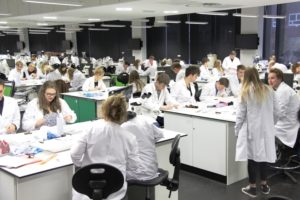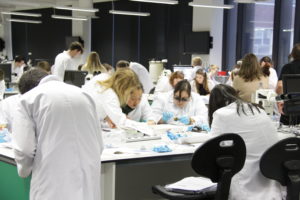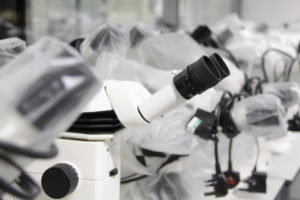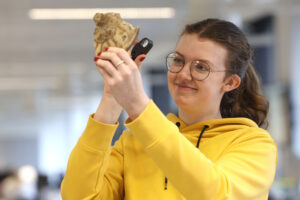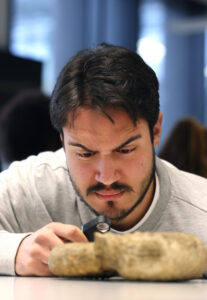How you'll learn
Teaching strategies include a mix of lectures, tutorials, workshops, field classes, research vessel cruises, laboratory work, computer sessions, group projects and individual work under supervision. You will typically receive around 15 hours of formal teaching each week, alongside residential and/or field days. You will study four modules per semester. A module might involve two one-hour lectures each week, and a laboratory or computer-based practical as well. Tutorials are an integral part of our approach, involving groups of 5-7 students meeting regularly with a member of academic staff to discuss study skills, careers, current research and topical issues.
As you progress through your degree, you are increasingly challenged to engage with current debates, to think critically and to study independently. You will do an ‘Honours Project’ throughout year three, which is a piece of independent research (field, lab or data analysis) on a topic of your choice, supervised by a member of academic staff. If you opt for the four-year integrated master’s programmes, you will spend 50% of your final year on a master’s project working closely within a research group on an area which may well generate publishable results.
A number of the School’s degree programmes involve laboratory and field work. The field work is carried out in various locations, ranging from inner city to coastal and mountainous environments. We consider applications from prospective students with disabilities on the same basis as all other students, and reasonable adjustments will be considered to address barriers to access.
How you're assessed
Assessment matches the learning objectives for each module and may take the form of written exams, coursework submissions in the form of essays, scientific papers, briefing notes or lab notebooks, oral and poster presentations and contributions to group projects. Coursework is designed around the types of problems encountered, and the skills needed, in commercial, research and public sector jobs. Emphasis is placed on good laboratory practice and maintaining useful lab notebooks in the context of scientific integrity and scientific data management.
Liverpool Hallmarks
We have a distinctive approach to education, the Liverpool Curriculum Framework, which focuses on research-connected teaching, active learning, and authentic assessment to ensure our students graduate as digitally fluent and confident global citizens.
The Liverpool Curriculum framework sets out our distinctive approach to education. Our teaching staff support our students to develop academic knowledge, skills, and understanding alongside our graduate attributes:
- Digital fluency
- Confidence
- Global citizenship
Our curriculum is characterised by the three Liverpool Hallmarks:
- Research-connected teaching
- Active learning
- Authentic assessment
All this is underpinned by our core value of inclusivity and commitment to providing a curriculum that is accessible to all students.

